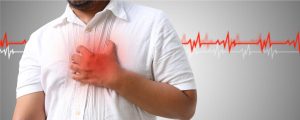Abnormalities in the heart such as irregular heart beat usually live on silently until an SOS intervention reveals the scale of damage they have made on your heart or other organs. Early detection through annual heart check ups after 35 and bi-annual heart check-ups after 50 can reduce the occurrence of irregular heart beats .
A person experiencing an abnormal heart rhythm may feel their heart racing (above 100 beats per minute) or slowing down (below 60 beats per minute), experience a fluttering in the chest, or experience a missed beat. This means that the electrical impulses in the heart that are either too rapid, too slow, or otherwise abnormal.
The impact of an irregular heart beat
If the heart doesn’t pump blood well because of an irregular heartbeat, organ damage can occur due to a lack of oxygen. Even though irregular heartbeats rarely pose serious health risks when you’re young, they might cause a number of uncomfortable symptoms in some people, such as dizziness, palpitations, chest pain, lightheadedness, fainting, trouble breathing, weakness, and fatigue. In extreme cases, sudden cardiac death can result from untreated abnormal heart rhythms.
In this article, we will explore what abnormal heart rate are, their causes, symptoms, diagnosis, and treatment options.
Types of abnormal heart rhythms
The various types of abnormal heart rhythms are as follows:
- Bradycardia: A heart rate of 60 beats or less per minute, which is significantly lower than the normal range.
- Tachycardia: A heart rate of over 100 heartbeats per minute is a tachycardic rhythm.
- Atrial fibrillation: Increased danger of stroke and heart failure is associated with atrial fibrillation, an irregular heart rhythm and rapid heartbeat.
- Supraventricular tachycardia: Rapid heart rate in the upper chambers of the heart is called supraventricular tachycardia.
- Ventricular fibrillation: When the lower chambers of the heart fibrillate instead of contracting normally, it’s called ventricular fibrillation, and it’s a potentially fatal arrhythmia.
Causes of abnormal heart rhythms
Abnormal heart rhythms can occur for a variety of reasons, including:
- Heart disease: Heart disease, such as coronary artery disease, can cause damage to the heart muscle, which can lead to arrhythmias.
- High blood pressure: High blood pressure can cause the heart to work harder, which can lead to arrhythmias.
- Congenital heart defects: Some people are born with heart defects that can lead to arrhythmias.
- Anxiety or emotional distress: The fight-or-flight response in the event of anxiety or other emotional distress can raise your heart rate and you may feel heart palpitations. And calming down usually slows down your heart rate.
- Electrolyte imbalances: Electrolytes, such as potassium and sodium, are essential for normal heart function. An imbalance in these electrolytes can cause arrhythmias.
- Medications: Some medications, such as beta-blockers and calcium channel blockers, can cause arrhythmias.

Symptoms of abnormal heart rhythms
The symptoms of heart rhythm disorder can vary depending on the type of arrhythmia and the severity of the condition. Some common symptoms include:
- Palpitations
- Dizziness or lightheadedness
- Shortness of breath
- Chest pain or discomfort
- Fatigue
Diagnosis of abnormal heart rhythms
Your doctor may suggest tests to diagnose an abnormal heart rhythm if you’ve been experiencing symptoms. Examples of examinations include:
- ECG: Electrocardiogram (ECG) is a noninvasive test that records the electrical activity of the heart.
- Holter: A portable device called a Holter monitor can record cardiac activity for up to 48 hours.
- Echocardiogram: Echocardiogram is a noninvasive test that uses sound waves to record the activity of the heart.
- Event Recorder: Records cardiac activity at the time of symptom occurrence.
- Stress test: The purpose of a treadmill stress test is to measure the cardiovascular system’s response to physical exertion.
Irregular heart beat treatment
The best way to treat fluctuating heart rate depends a lot on how it is diagnosed and how bad it is. Typical methods of irregular heart beat treatment include:
- Beta-blockers and drugs that stop abnormal heart rate are two examples of medicines that can help control them.
- Shock therapy restores healthy heart rhythms.
- Pacemakers and implantable cardioverter defibrillators (ICDs) are examples of implantable devices. Regulation of the heart’s rhythm and cardiac arrest prevention is the main job of these devices.
- Quitting smoking, reducing alcohol and caffeine intake, and learning to manage stress are all good examples of lifestyle changes. They benefit heart health and lower the risk of arrhythmias.
Conclusion
In conclusion, it is important to seek immediate medical attention for abnormal heart rhythms. Knowing the signs of arrhythmias and when to seek medical attention is crucial. Making changes to one’s lifestyle is a very good way to lower the risk of arrhythmias.. Treating any underlying health conditions, and considering additional measures are also promising ways to minimize the damage. TrueBasics Heart Omega-3 is one such nutritional supplement that can help contribute to a healthier heart. It reduces the risk of heart-related complications. The 4 heart strengthening ingredients along with Antarctic krill oil is proven to reduce cholesterol and harmful triglyceride levels by up to 33%.














